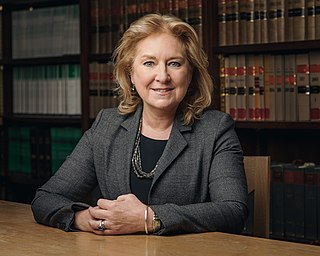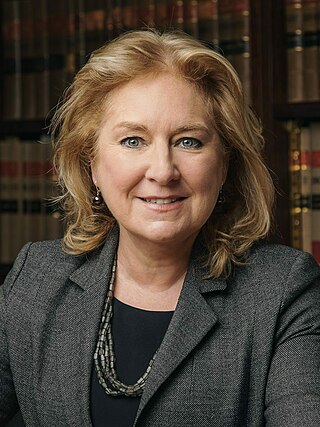
The lady chief justice of England and Wales is the head of the judiciary of England and Wales and the president of the courts of England and Wales.

The Constitutional Reform Act 2005 is an Act of the Parliament of the United Kingdom, relevant to UK constitutional law. It provides for a Supreme Court of the United Kingdom to take over the previous appellate jurisdiction of the Law Lords as well as some powers of the Judicial Committee of the Privy Council, and removed the functions of Speaker of the House of Lords and Head of the Judiciary of England and Wales from the office of Lord Chancellor.
Puisne judge and puisne justice are terms for an ordinary judge or a judge of lesser rank of a particular court. The term comes from a combination of the two French words, puis, "since, later" + né, and "born", which have been combined as French: puisné or puîné; meaning "junior".

The High Court of the Hong Kong Special Administrative Region is a part of the legal system of Hong Kong. It consists of the Court of Appeal and the Court of First Instance; it deals with criminal and civil cases which have risen beyond the lower courts. It is a superior court of record of unlimited civil and criminal jurisdiction. It was named the Supreme Court before 1997. Though previously named the Supreme Court, this Court has long been the local equivalent to the Senior Courts of England and Wales and has never been vested with the power of final adjudication.

A Lord Justice of Appeal or Lady Justice of Appeal is a judge of the Court of Appeal of England and Wales, the court that hears appeals from the High Court of Justice, the Crown Court and other courts and tribunals. A Lord Justice of Appeal is the second highest level of judge in the courts of England and Wales. Despite the title, and unlike the former Lords of Appeal in Ordinary, they are not peers.
The Judicial Appointments Commission (JAC) is an independent commission that selects candidates for judicial office in courts and tribunals in England and Wales and for some tribunals whose jurisdiction extends to Scotland or Northern Ireland.

There are various levels of judiciary in England and Wales—different types of courts have different styles of judges. They also form a strict hierarchy of importance, in line with the order of the courts in which they sit, so that judges of the Court of Appeal of England and Wales are given more weight than district judges sitting in county courts and magistrates' courts. On 1 April 2020 there were 3,174 judges in post in England and Wales. Some judges with United Kingdom-wide jurisdiction also sit in England and Wales, particularly Justices of the United Kingdom Supreme Court and members of the tribunals judiciary.

Dame Victoria Madeleine Sharp,, PC is the President of the King's Bench Division of the High Court of Justice in England and Wales.

The Judges' Council is a body in England and Wales that, representing the judiciary, advises the Lord Chief Justice on judicial matters. It has its historical roots in the original Council of the Judges of the Supreme Court, created by the Judicature Act 1873 to oversee the new Supreme Court of Judicature. This body initially met regularly, reforming the procedure used by the circuit courts, and the new High Court of Justice but met less regularly as time went on, meeting only twice between 1900 and 1907, with a gap of ten years between meetings in 1940 and 1950 respectively. After relative inactivity, it was eventually wound up through the Supreme Court Act 1981, which contained no provisions for its continued existence, something Denis Dobson attributes to newer bodies which performed the duties the Council had originally been created to do.

Justices of the Supreme Court of the United Kingdom are the judges of the Supreme Court of the United Kingdom other than the president and the deputy president of the court. The Supreme Court is the highest court of the United Kingdom for all civil cases, and for criminal cases from the jurisdictions of England and Wales and Northern Ireland. Judges are appointed by the British monarch on the advice of the prime minister, who receives recommendations from a selection commission.

David Lloyd Jones, Lord Lloyd-Jones, PC, FLSW is a British judge and legal scholar. He has served as a Justice of the Supreme Court of the United Kingdom since 2017, and has also served as a member of the Court of Appeal of England and Wales and as a chairman of the Law Commission prior to joining the Supreme Court.
Dame Julia Wendy Macur, DBE, known as The Rt Hon Lady Justice Macur, is a British judge of the Court of Appeal of England and Wales. Between April 2017 and December 2019, she was the Senior Presiding Judge for England and Wales.
The Senior Presiding Judge for England and Wales is a member of the Court of Appeal appointed by the Lord Chief Justice to supervise the Presiding Judges for the various judicial circuits of England and Wales. The Senior Presiding Judge is responsible for deployment and personnel issues for all circuits and acts as a "general point of liaison" for the courts, judiciary and Government.

Vivien Judith Rose, Lady Rose of Colmworth, is a British judge currently serving as a justice of the Supreme Court of the United Kingdom.

Sue Lascelles Carr, Baroness Carr of Walton-on-the-Hill,, is an English judge who has served as Lady Chief Justice of England and Wales since 1 October 2023. She is the first woman to serve as the head of the judiciary of England and Wales since the inception of the office of Lord Chief Justice in the 13th century. Carr previously served as a High Court judge from 2013 to 2020 and a Lady Justice of Appeal from 2020 to 2023.

Dame Kathryn Mary Thirlwall, DBE, styled The Rt Hon Lady Justice Thirlwall, is an English judge of the Court of Appeal, and since December 2019 is the Senior Presiding Judge for England and Wales. She practised as a barrister from 1982, was a High Court judge from April 2010, and was promoted to the Court of Appeal of England and Wales in February 2017.

Dame Elisabeth Mary Caroline Laing,, styled The Rt. Hon. Lady Justice Elisabeth Laing, is a Lady Justice of Appeal of the Court of Appeal of England and Wales.
Dame Nerys Angharad Jefford, styled The Honourable Mrs Justice Jefford, DBE is a High Court Judge of England and Wales.
Dame Karen Margaret Steyn, DBE is a British High Court judge.












